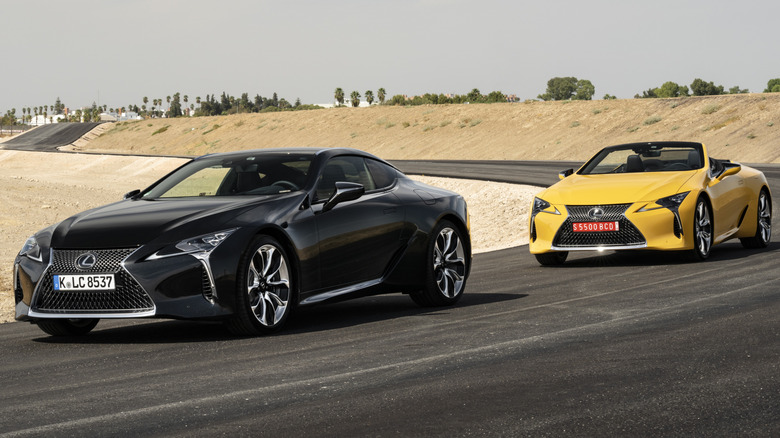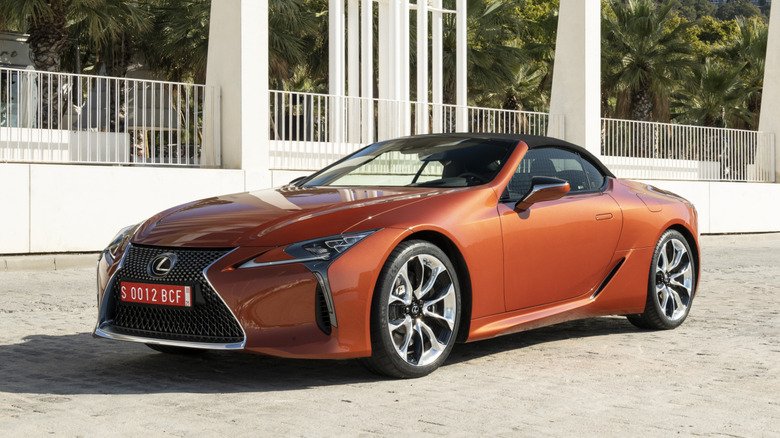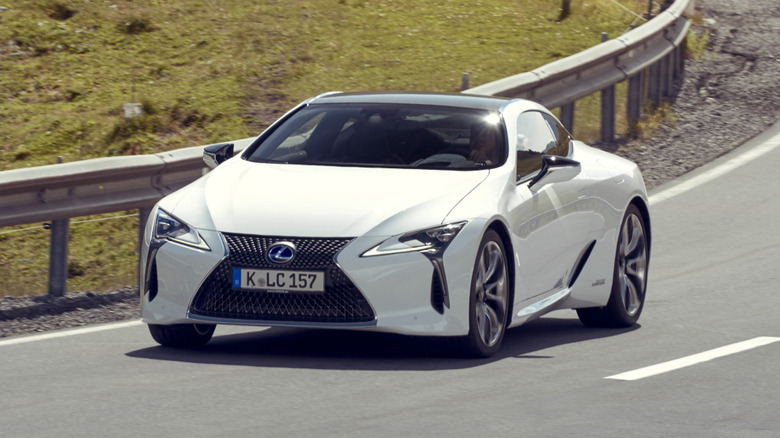The Embarrassing Reason Why Lexus Had To Discontinue The LC 500 Hybrid
The Lexus LC500 was first introduced in 2017 to compete with its Japanese sporty rivals, the Nissan GT-R and the Honda NSX. Offered with a naturally aspirated 471 hp 5.0-liter V8 as the LC500 or a 354 hp V6 hybrid for the LC500h, this sporty coupe appealed to both driving purists and those seeking superior efficiency from a hybrid. The LC500 is also available in either coupe or convertible form, considered by many to be one of the best-looking convertibles ever built by Lexus.
In terms of sales, the LC500 was never a smash hit to begin with, but the hybrid version sold particularly poorly. Lexus only managed to sell seven LC500h examples through June 2025, putting it on track for record-low sales. This is the very reason why Lexus decided to discontinue the LC500h for the 2026 model year in the US, since everyone wanted to buy the V8. To make matters worse, Lexus only managed to move 248 examples of the LC500h throughout its entire production run, an embarrassing figure that ultimately sealed the fate of the hybrid LC.
Why most buyers choose the V8 over the hybrid
Speaking to The Drive, a Lexus spokesperson confirmed that the brand only sold eight LC500h examples in 2024. One begins to question whether the market misunderstood the LC500h, or whether the hybrid powertrain met enthusiast expectations for a performance-oriented car like the LC500.
As mentioned, the V8 LC500 is powered by a V8, which is both faster and lighter than the hybrid. According to Business Insider, "the LC 500 is old school with a big V8 under the hood; the LC 500h is like a Prius gone mad." This perfectly describes the LC500h: capable, efficient, yet a bit underwhelming for a sports car. The V8 in the LC500 pushes to a visceral-sounding 7,300 rpm red line, which is something the LC500h struggles to compete with, and that is very important in a sports car.
Moreover, when the LC500h launched, hybrids weren't as common, but nowadays, they very much are, and they rarely appeal to enthusiasts in the same way as a high-revving V8. The emotional aspect plays a big role when buying a sports car, and it's difficult for a hybrid to ever be as emotional as one of the last naturally aspirated V8s on the market.
The problem with hybrid performance cars
The world of performance cars is rapidly changing. With 7-seater family SUVs like the Tesla Model X Plaid capable of reaching 60mph in just 2.5 seconds, speed isn't as impactful as it once was. For context, the ludicrous McLaren P1 hypercar is 0.3 seconds slower than the Plaid to 60mph. The new Mercedes C63 AMG is also a perfect example. With four cylinders, hybrid boost, and 671 hp, it is the most powerful, quickest, and most complicated version of the C63 ever, yet its sales are suffering.
One of the main reasons why hybrid performance cars are struggling is that they are heavy. The aforementioned C63 AMG is 762 pounds heavier than the last C63, while also being 859 pounds heavier than its fiercest competitor, the BMW M3. The new hybrid BMW M5 weighs in at 5,390 pounds, which is 1,045 pounds heavier than the previous M5 and even heavier than the BMW X5. Another reason is the sheer complexity that comes with a hybrid powertrain, which also questions long-term reliability and how exciting a performance car feels, both of which are very important for a performance car.
All of this brings us back to the Lexus LC500h and its unfortunate demise. As Doug DeMuro explained in his LC500 review, "Do not get this engine. No matter what you do, don't get that powertrain. It's more efficient, but you'll lose the primary benefit of this car — one of the very last naturally aspirated V8s in the entire car world, and a great one at that. Skip the LC500h, please." Sales figures suggest that many buyers shared a similar sentiment.


